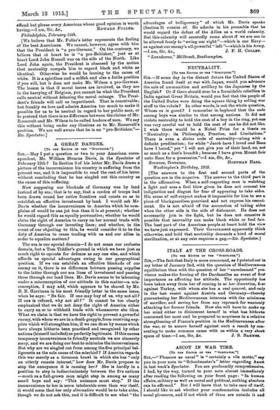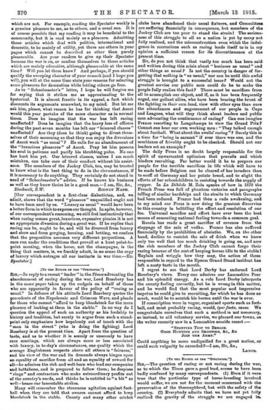ASCOT IN WAR TIME.
[To TDB Eimer. or ring arrarrroAn San,—" Pleasure as usual" is "certainly a vile motto," say you in your note to "Schoolmaster's" letter regarding Ascot in last week's Spectator. You are profoundly comprehensive. I had, by the way, turned to your note almost immediately after reading the following on your front page: "in human affairs, military as well as moral and political, nothing absolute can be affirmed." But I will leave that to take care of itself. I should like to ask whether your condemnation includes all usual pleasures, and if not which of theta are outside it and
which are not. For example, reading the Spectator weekly is a genuine pleasure to me, as to others, and a usual one. It is of course possible that my reading it may be beneficial to the community, but it is read mainly as a pleasure. Admitting those articles which deal with politics, international and domestic, to he mainly of utility, yet there are others in year pages which cannot be described as other than purely pleasurable. Are your readers to give up their Spectator because the war is on, or confine themselves to those articles which are mainly educative, although pleasurable at the same time? Will you let them know? And perhaps, if you should qualify the sweeping character of your remark (and I hope you will), you will at the same time etateyour reasons for selecting some pleasures for damnation while letting others go free. As to " Schoolmaster's " letter, I hope he will forgive me for saying that it strikes me as approximating to the hysterical. It is almost frantic in its appeal, a fact which discounts its arguments somewhat, to my mind. But let me ask him, please, what reason he has for thinking that Ascot would this year partake of the same character as in normal times- Does he imagine that the war has left racing unaffected? Does be imagine that the heavy loss of officers during the past seven months has left our "leisured classes" unaffected ? Are they (does he think) going to divest them- selves of their mourning so that they can enjoy the diversions of Ascot week "as usual" ? He calls for an abandonment of the "luxurious pleasures" of Ascot. Pray let him possess his soul in patience and pacify his throbbing pulse. No one has hurt him yet. Our leisured classes, unless I am much mistaken, can take care of their conduct without his assist- ance. The members of the Jockey Club, too, may be trusted to know what is the hest thing to do in the circumstances, if it is necesemy to do anything. They certainly do not stand in need of "Schoolmaster's" advice. If he knows his business as well as they know theirs he is a good man.—I am, Sir, &c., Stockwell, S.W. SIDNEY NASH. [Oar correspondent is a first-class dialectician, and, we admit, shows that the word "pleasure" unqualified ought not to have been used by us. "Luxury as usual" would have been abetter form in which to express our thought In spite, however, of our correspondent's reasoning, we still feel instinctively that when racing means great, luxurious, expensive picnics it is not an appropriate diversion during a great war. If he replies that racing can be, ought to be, and will be divorced from luxury and show and from gorging, boozing, and betting, we confess that the proposition assumes very different proportions. A race run under the conditions that prevail at a hunt point-to- point meeting, when the horse, not the champagne, is the thing that matters, is, we frankly admit, in no sense the orgy of luxury which outrages all our instincts in war time.—En. Spectator.]



































 Previous page
Previous page